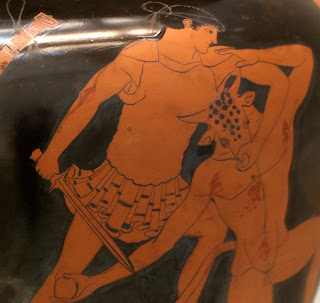I want to begin with a quote describing the sacrifice of a horse to the Greek god Poseidon, “even now, I still remember. How he reared up like a tower, feeling his death, dragging the men like children; the scarlet cleft in the white throat, the rank hot smell; the ruin of beauty, the fall of strength, the ebb of valor; and the grief, the burning pity as he sank upon his knees and laid his bright head in the dust. That blood seemed to tear the soul out of my breast, as if my own heart had shed it.”
It’s from The King Must Die by Mary Renault, published in 1958. In the 57 years since it was published the world has never quite known what to make of Renault’s Euhemeristic telling of the story of Theseus; my informal survey of what’s been written recently suggests that’s still the case. When it first appeared, it was conveniently and patronizingly boxed as excellent adventure fiction: interesting, fun perhaps not that important. I consider it so much more. A more apt comparison is Gustave Flaubert’s “The Tale of St. Julian Hospitator.” The King Must Die’s relatively short 332 pages is a tour-de-force of profound and elegant world-building, original character creation and dramatic story telling. Rightly considered it is a fantasy classic as innovative and original as the work of J. R. R. Tolkien, her tutor at Oxford, or T. H. White or Lewis Carroll.
The novel develops over 26 different characters with such immediacy and deftness that the scale of that achievement often goes unnoticed. Then there is Renault's depiction of Mycenaean/Minoan Greece. It is visceral and sensual: replete with colors, sounds, smells and tastes yet her prose is so efficient that the force of the drama is never hindered. More deeply, she creates cultures, patriarchal and matriarchal societies in conflict, immersing the reader to the extent that you not only understand them but empathize with the faith and personal passions driving them both. The supernatural world is immediate but ambiguous ironically making her creation even more tangible and credible.
The engine
for this magnum opus is her prose. Look
back at the quote at the beginning. Note
how concrete and physical details, Hemingwegian in their spareness, develop
into a severe lyricism recalling the great Romantic poet, Percy Byshhe Shelley then
finishing in terrible, personal emotion.
It works and works brilliantly only because of how carefully and
logically and rhythmically all three are wrought. Every subordinate phrase is earned and
justified. Such skill was hard
earned. Her descriptions of combat and
death are among the most powerful I’ve read and I’ve always felt that came in
part from her personal experience as a nurse during World War II as well as her
classical education at Oxford.
Because the book is an adventure it’s rarely examined philosophically, yet it has much to offer about the nature of gender, sexuality and political leadership, topics of particular pertinence to our time. Renault’s Theseus, tough, sexual, ambitious, is a hero who thinks. And sees.
I’ve just
read it again, (between long and careful sessions with Caroline S. Dunn’s
dissertation for my Malory research) and found it as compelling as I did the
summer I was fourteen and read it for the first time. Theseus and the Minotaur is one of the
greatest tales of western culture; The
King Must Die is perhaps its greatest telling. Here’s one last quote, the witch Medea
whispering prophesy into Theseus’ ear,
“Theseus of
Athens. You will cross water to dance in
blood. You will be king of the
victims. You will tread the maze through
fire and you will tread it through darkness.
Three bulls are waiting for you, son of Aigeus. The Earth Bull, the Man Bull and the Bull
from the Sea.”








1 comment:
Somewhat embarrassed to admit I had not read this until this last year, somehow. Renault shows an amazing insight into the male psyche, for a woman, especially one of her era.
One of my favorite lines: ""You will walk lighter after, when there is no looking back."
Post a Comment